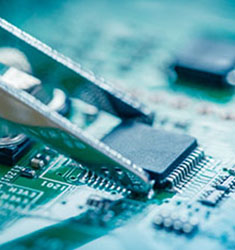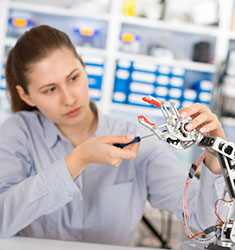Program Description
Mechatronics is a multidisciplinary field that uses a broad set of engineering principles to design systems that integrate mechanical and electronic components: for example, the control systems in modern vehicles or the Mars rovers. Knowledge from several fields and disciplines—like mechanical engineering, electrical engineering, and computer science—is combined to create mechatronics devices and systems: including smart appliances, biomedical devices, vehicles, drones and robots. The field is relatively young, meaning you can contribute to research and breakthroughs in the area while still an undergraduate student. The Mechatronics curriculum consists of a year-long mechatronics sequence and electives chosen by the student: course options range from system dynamics and robotics to electric motors and scientific instrumentation. The culminating experience of the program is a mechatronics project designed and completed by the student, requiring you to combine mechanical and electrical engineering concepts to design a real system with mechanisms, sensors, actuators, and embedded control. This project can also serve as your Senior Capstone Design project. With this certificate, you will learn the theoretical knowledge and technical skills you need to engineer solutions and make a difference in the field of mechatronics.
Academic and Career Opportunities
This certificate is available to all engineering students, as well as students from an allied science field. In addition to academics, be sure to get involved with the department and meet peers and faculty members by joining student groups like the American Society of Mechanical Engineers (ASME), the Institute of Electrical and Electronics Engineers (IEEE), or Utah Student Robotics (USR). Upon graduation, you can use the hands-on skills you gained as a mechatronics student to assist you in fields in engineering and science. For example, you might become a mechanical engineer specializing in equipment design or creation or enter the field of computer engineering to create faster microprocessors.
More Info
- Department of Mechanical Engineering
- Price College of Engineering
- Department Advising
- U Career Success
Catalog
Exploratory Classes
- ECE 2210 - Electrical and Computer Engineering for Nonmajors
- ME EN 3220 - Dynamic Systems and Control
- ME EN 3230 - Mechatronics

 Mechatronics
Mechatronics


